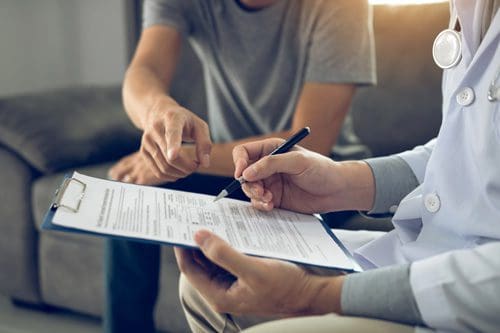 Alcohol withdrawal can be a difficult process that can prevent a person from wanting to get sober. Withdrawal occurs when you use alcohol regularly and drink heavily, then suddenly stop drinking. Symptoms can be painful, and some can be severe or life-threatening. It is not recommended to attempt to detox from alcohol at home. In a professional detox program, doctors and nurses will monitor a person’s withdrawal and administer medical intervention as needed to make the experience safe and as comfortable as possible.
Alcohol withdrawal can be a difficult process that can prevent a person from wanting to get sober. Withdrawal occurs when you use alcohol regularly and drink heavily, then suddenly stop drinking. Symptoms can be painful, and some can be severe or life-threatening. It is not recommended to attempt to detox from alcohol at home. In a professional detox program, doctors and nurses will monitor a person’s withdrawal and administer medical intervention as needed to make the experience safe and as comfortable as possible.
Common Alcohol Withdrawal Symptoms
When a person who is addicted to alcohol quits abruptly, it causes an imbalance in their brain’s neurotransmitters, which results in a range of physical and emotional symptoms. Some people experience symptoms of withdrawal as soon as their blood alcohol level lowers and they begin to sober up. Symptoms can begin as soon as two hours after their last drink and can vary depending on the person and on the length and severity of addiction.
Some common symptoms of alcohol withdrawal include headaches, nausea, and fatigue as well as:
- Shaking
- Sweating
- Insomnia
- Anxiety
- Depression
- Irritability
- Vomiting
- Loss of appetite
- Diarrhea
- Dehydration
Severe Alcohol Withdrawal Symptoms
For those who have been drinking heavily for a long period of time, withdrawal symptoms may be more severe and can even be fatal. Severe alcohol withdrawal can be dangerous and can result in a condition called delirium tremens (DTs). DTs causes a change in the brain and central nervous system and is treated as a medical emergency since it is life-threatening. Signs of delirium
tremens are:
- Body tremors
- Severe confusion or delirium
- Restlessness
- Sensitivity to light and sound and even touch
- Agitation and irritability
- Changes in mood or mental function
- Sleep that is deep and lasts at least a day
- Seizures
- Hallucinations
DTs can cause symptoms that worsen quickly over time. The symptoms typically occur within the first 48 hours after drinking stops but can happen anytime within the first 10 days. The timeline for withdrawal symptoms can be different for each person.
Alcohol Detox Options
Since it can be dangerous to withdraw from alcohol on your own, finding a treatment center that offers detox services can help provide a safe environment that can monitor and address any complications as they happen. To help a client detox from alcohol, the treatment center may provide:
- Medication. Medication may be given to help reduce withdrawal symptoms and relieve pain and discomfort. A variety of medications can be administered depending on the person’s specific condition and needs. Medications may include benzodiazepines, barbiturates, anticonvulsants, and antipsychotics.
- Close monitoring. Vitals such as your heart rate and blood pressure can be monitored while you detox and any emergencies can be addressed if they occur.
- Support. You will be surrounded by professionals that can give you the physical and emotional support you need.
During detox, your body and brain will both struggle without alcohol, but under supervision the process can be manageable.
After Detox
Detox is not a cure for addiction, and it is not the end of the treatment process. While detox breaks the physical dependence on alcohol, it does nothing to address the psychological and emotional issues that led to the addiction. Most treatment facilities will recommend residential or outpatient treatment following detox. These long-term treatments may include individual therapy, group therapy, family therapy, addiction education, holistic healing options, nutrition education, and relapse prevention planning.
Help Is Available for Alcohol & Drug Detox
At Twin Lakes Recovery Center, we understand that the thought of detox can be overwhelming and frightening. We offer drug and alcohol detox services as the first step in our treatment process. Our experienced staff is available 24 hours a day to help provide a safe and comfortable detox in a home-like setting. We can administer medication to help ease the pain and discomfort of withdrawal and develop an individualized plan of care to meet your specific needs.
To find out more about what programs and services Twin Lakes Recovery Center has to offer, contact one of our addiction specialists to set up a confidential consultation by filling out our convenient online contact form.



